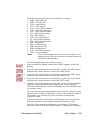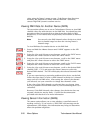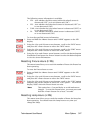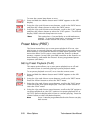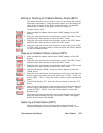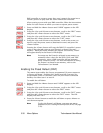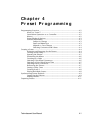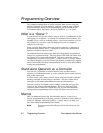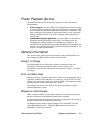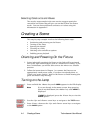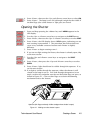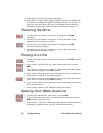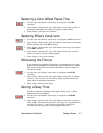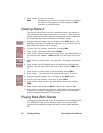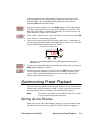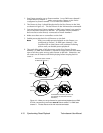Technobeam
®
User Manual Programming Overview 4-3
Preset Playback Options
Technobeam offers the following two options for use with preset
programming:
•
Preset capture:
Use any DMX 512-compatible controller to create
a scene(s) that can then be saved into the fixture’s own presets and
later recalled in stand-alone operation without the controller. The
only constructs that
cannot
be captured in this way are crossfade
(XFAD) and delay (DLAY); you must configure them manually on
each fixture.
•
Synchronized preset playback:
Use one fixture to synchronize
playback among all fixtures on the link. One fixture must be
configured as fixture number 1 or at DMX start channel 1. No
controllers can be attached to the link containing the synchronized
fixtures. See the section titled “Synchronizing Preset Playback” on
page 4-9 for more information.
General Information
This section lists general points you need to keep in mind while you
are creating and playing back scenes on the fixture.
Subject to Change
The information in the following sections is based on what was
available at the time this manual went to print; however, all
information—particularly constructs and construct values—is subject
to change.
Enter and Menu Keys
Whenever you are creating a scene, the <Enter> key
accepts
the current
selection, whether that selection is a construct—such as SHUT for the
shutter—or a value for a construct, such as OPEN. Each construct value
is automatically saved when you press <Enter>.
The <Menu> key moves you back to the previous option or menu
without changing
a value.
MSpeed vs. Fast Changes
Some constructs allow you to choose either fast position selection or
position selection set by MSpeed (motor/mirror speed).
A
fast
change means the position selection is completed in the shortest
length of time after the wheel starts moving.
An
MSpeed
(motor/mirror speed) change occurs smoothly over the
entire MSpeed time value. A table of MSpeed times is shown in
Appendix A of the user manual.



